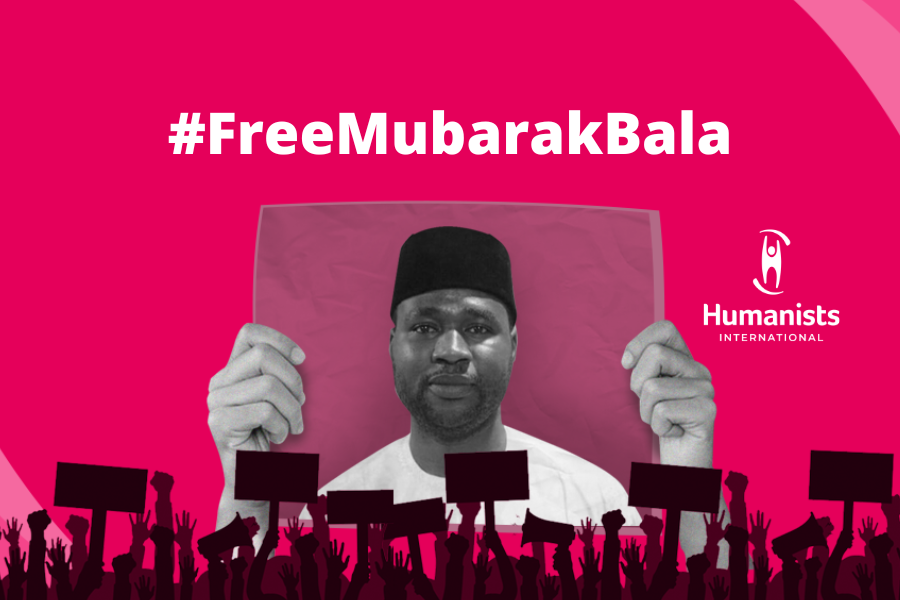
Nigeria: UN Working Group concludes Mubarak Bala’s detention is arbitrary
#FreeMubarakBala

#FreeMubarakBala

Emma Wadsworth-Jones, Casework & Campaigns Manager
Emma Wadsworth-Jones, Humanists International’s Casework and Campaigns Manager said:
“Mubarak Bala is a significant and valued member of the global humanist community. As president of the Humanist Association of Nigeria, Bala has worked tirelessly to promote human rights education, freedom of religion or belief for all, peace, and stability. The UN Working Group on Arbitrary Detention’s opinion confirms that his imprisonment was a direct result of his peaceful activism. We call on the government of Nigeria to abide by the decision and immediately release Bala.”
Karl Horberg, Program Director at Freedom Now, said:
“It has been more than three and a half years since Nigeria’s Federal High Court ordered Bala’s release, yet he remains wrongfully imprisoned. Nigeria’s international partners should compel the government to abide by its international commitments and release Bala.”
Vice President of Policy and Advocacy at Freedom House, Annie Boyajian, said:
“The UN Working Group’s decision vindicates the ongoing campaign to release Bala and finally reunite him with his family. We join our partners today in urging Nigeria to abide by the decision without delay.”
Background:
The son of an Islamic scholar and a chemical engineer by training, Bala began exploring religion in his youth and spoke openly about leaving Islam. He began advocating for freedom of religion or belief and was particularly outspoken about the restrictive environment in his home state of Kano, which employs Sharia law. He also campaigned against blasphemy laws, educated others about human rights, and spoke out on the dangers of religious extremism. As Bala became one of the country’s most prominent critics of harmful religious practices, he began receiving death threats. In 2014, his father and uncles conspired to drug, beat, and forcibly commit him to a psychiatric ward, claiming that his atheism was a sign of a personality disorder.
Bala was released after a two-week stay, only to face continued threats to his safety and accusations of ‘apostasy’ for his decision to break from Islam, even though states using Sharia law in Nigeria do not label it as an offense in their penal codes. After a period in hiding, Bala decided to stay in Nigeria, moving to the secular Kaduna State. He became president of the Humanist Association of Nigeria, advocating for freedom of religion or belief and humanist values.
In April 2020, Bala was arrested by plainclothes officers in Kaduna over Facebook comments that some alleged had insulted the prophet Muhammad. He was transferred back to Kano.
The case against Bala was riddled with procedural irregularities from the very beginning. He was held without charge for more than a year and denied access to medical care and to his legal team, during a time when Nigeria’s constitutional promise of freedom of religion or belief was severely undermined. The Federal High Court in Abuja ruled Bala’s arrest unconstitutional in December 2020 and ordered authorities to release him on bail, but that order was ignored. When Bala’s trial finally concluded in April 2022, he received a severe and disproportionate 24-year prison sentence from the Kano State High Court, which ignored his pleas for leniency. In May 2024, an appeals court reduced Bala’s sentence to five years.
Nigeria is rated Partly Free in Freedom House’s Freedom in the World 2024 report with a democracy score of 44/100. The country has a score of 20/40 for political rights and 24/60 for civil liberties.
According to Humanists International’s Freedom of Thought Report, “Nonreligious people face social persecution and prohibitive social taboos in Nigeria.” Humanists and other nonreligious individuals face regular harassment and persecution and are often painted as “immoral”; many face threats of violence and are forced to conceal their true beliefs and identity to ensure their own security. The nonreligious are often completely overlooked for inclusion in dialogues on freedom of religion or belief and tolerance.
Bala’s case painfully demonstrates not only how pervasive the repression of freedom of religion or belief is in Nigeria, but how ineffective institutions like the Judiciary are in upholding constitutional protections.
As a registered charity and NGO, we rely on the donations we receive from our members and supporters to help us protect humanists at risk of persecution and violence around the world. If you support our aims, please consider giving a one-off or regular gift today. Thank you.